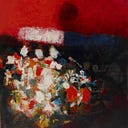The Dark and the Lightless
They say there is no true black
Without light—for black is the substractive,
The without, the anti-light, the lack
And not merely a solid tint, a matter, an objective
And strange species of camouflaged darkness;
No, the darkest black is that which retains a subjective
Lighter vantage point—the sheen of enamel or bitumen, to harness
The darkness of the backdrop, to dominate the reflective
The darkest of all blacks is not slick, or smooth, it is rough;
But the truest black is not the purest black; the purest is celestial,
That of a curtained night or of closed eyelids on days, cold enough,
Where my breath is a cloud obscuring all orbits and referentials
Of satellites, of stars, of planets, only those of my eyes remain
And no light gets to me—and yet I radiate, like an eclipse,
When all other light is obscured by time’s amnesia a more humane
Surrogate lights up my new moon’s nights—it is eigenlicht, the ellipse
Of my retina diffuses a grayish glow
The purest black is the least seductive
And when my days are not splattered with the ruins of when the moon was low
And the sun was high, when memories of the comparative
Do not remind me of the darkness beneath
The black, though as pure as ever
Is lightless, and so much lighter, a sheath
That embalms me but does not sever
The uneventful, the unwoed present
I cry when the stars remind me of the moon’s descent
